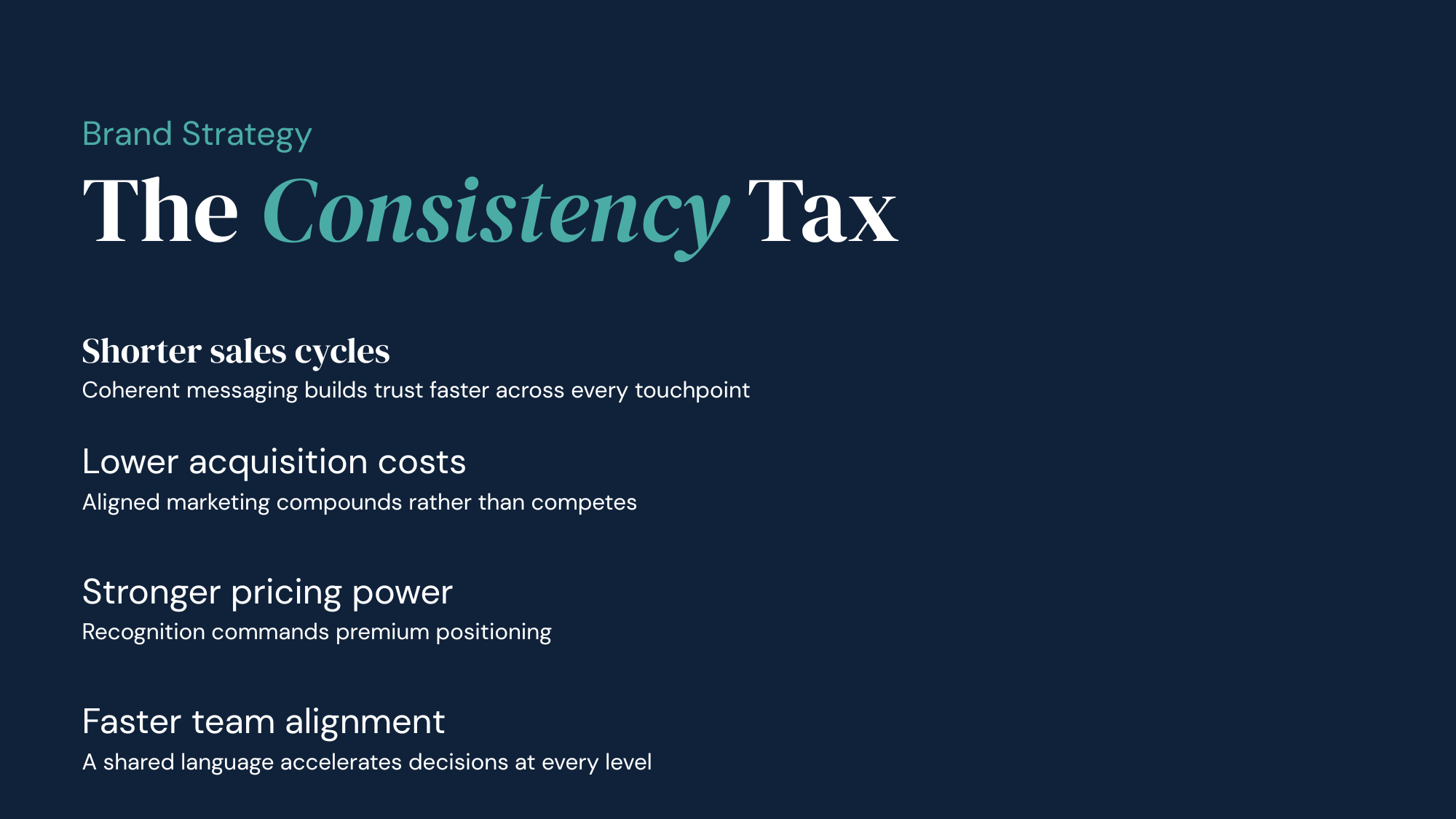Brand as growth insurance
As businesses scale, the biggest risk to value is fragmentation, not demand.
This article explores why investors view brand clarity as a critical driver of alignment, repeatable growth and valuation, and why brand at scale functions as growth insurance rather than differentiation.
Shouting from the top of the mountain: Where is everyone else?
You've articulated the vision. You've run the offsites. Everyone nods in agreement. But nothing changes.
McKinsey's research shows companies with aligned executive teams are almost twice as likely to achieve above-median financial performance - yet 75% of cross-functional teams are dysfunctional. The problem isn't commitment. It's clarity. Here's why brand strategy is the leadership infrastructure that bridges the gap.
The Consistency Tax: Why brand fragmentation is costing you more than you think
Inconsistent branding isn't a creative problem, it's a £1-in-£5 problem. Research shows consistent brand presentation increases revenue by 23-33% - which means inconsistent brands are leaving nearly a quarter of potential revenue on the table.
For high-growth businesses, the consistency tax compounds fast: longer sales cycles, higher acquisition costs, reduced pricing power, and slower team alignment. Here's what the research reveals and what to do about it.
Revolut: Disrupting finance services with investor-ready marketing
In just a few short years, Revolut has gone from a UK-based startup to a global fintech leader. Founded in 2015 by Nikolay Storonsky and Vlad Yatsenko, Revolut aimed to disrupt traditional banking with its app-based financial services. By offering seamless currency exchange, free international transfers, cryptocurrency trading, and budgeting tools all in one platform, Revolut provided a modern, customer-centric alternative to outdated banking systems. But behind this meteoric rise lies a carefully crafted marketing strategy that not only drove rapid growth but also attracted billions of pounds in investment.
Let’s explore how Revolut used marketing to secure investor confidence and become one of the most successful fintech companies in the world.
BrewDog: Crafting a rebel identity to secure major investments
BrewDog’s strong and distinctive brand, combined with their innovative funding model, has not only resonated with customers but also attracted significant interest from traditional investors. In 2017, BrewDog secured a £213 million investment from TSG Consumer Partners, a private equity firm based in the United States, valuing the company at over £1 billion. This investment was a major milestone for BrewDog, cementing its status as a global leader in the craft beer industry.
Unlocking brand ROI: Gaining alignment with your CFO on the power of brand
Convincing your Chief Financial Officer (CFO) to allocate substantial resources to brand-building activities can be challenging. CFOs are typically focused on numbers, cost control, and immediate returns on investment (ROI). To secure their buy-in, it’s crucial to present a compelling case that connects brand investment directly to financial outcomes. Here’s how you can effectively provide your CFO with the information they need on the benefits of investing in your brand.
Why building brand equity is essential for securing the right investment
A strong brand is one of the most powerful tools a company can leverage when seeking investment. Companies with strong brands not only attract more customers; but also enjoy higher valuations and better terms when raising capital.
Why a strong brand MOAT is a golden ticket for investors
Brand MOAT is a concept that refers to the competitive advantage that a brand possesses, which protects it from competitors and allows it to maintain market share and profitability over time. The term “MOAT” originally comes from the idea of a moat surrounding a castle, serving as a defense mechanism against invaders. In business, a “moat” refers to any factor that gives a company a durable competitive edge.
Enhancing employee engagement and business performance
As organisations grapple with evolving workforce expectations and a rapidly changing market environment, the importance of a well-defined and embedded Employee Value Proposition (EVP) cannot be overstated.
Building brand equity: A strategic investment for Venture Capitalists
In the world of venture capital, the search for high-potential investments is relentless. While product innovation and market potential often take center stage during the decision-making process, there is another critical factor that can significantly impact the long-term success and value of an investment: brand equity. Investing in a company with a strong brand not only enhances its market position but also plays a pivotal role in increasing its overall valuation and exit potential.
Rebrand or refresh: Which is right for your brand?
The decision to rebrand or refresh your brand can have a significant impact on any high-growth business, and making the right choice is crucial.
Brand investment matters to the City, reveals new IPA/Brand Finance survey
A recent article from the IPA discusses the findings of the IPA/Brand Finance Investment Analyst Survey, highlighting that investment analysts consider brand strength crucial for a company’s success.
The power of strategic brand positioning for high-growth businesses
In the ever-evolving landscape of business, growth is the ultimate goal. However, achieving sustainable growth requires more than just a stellar product or service. It necessitates a well-defined, strategic brand positioning that not only differentiates your business but also resonates deeply with your target audience.













